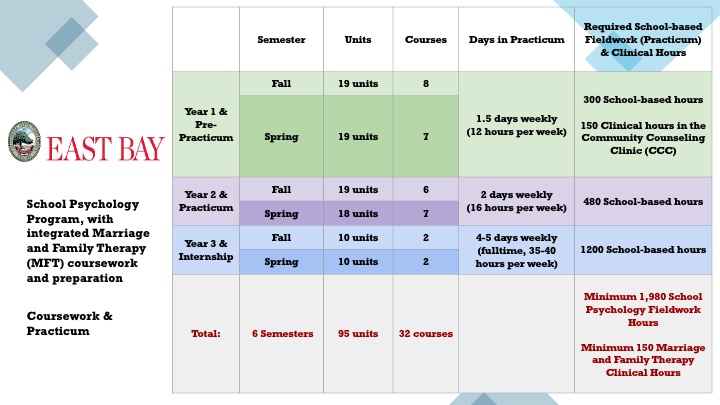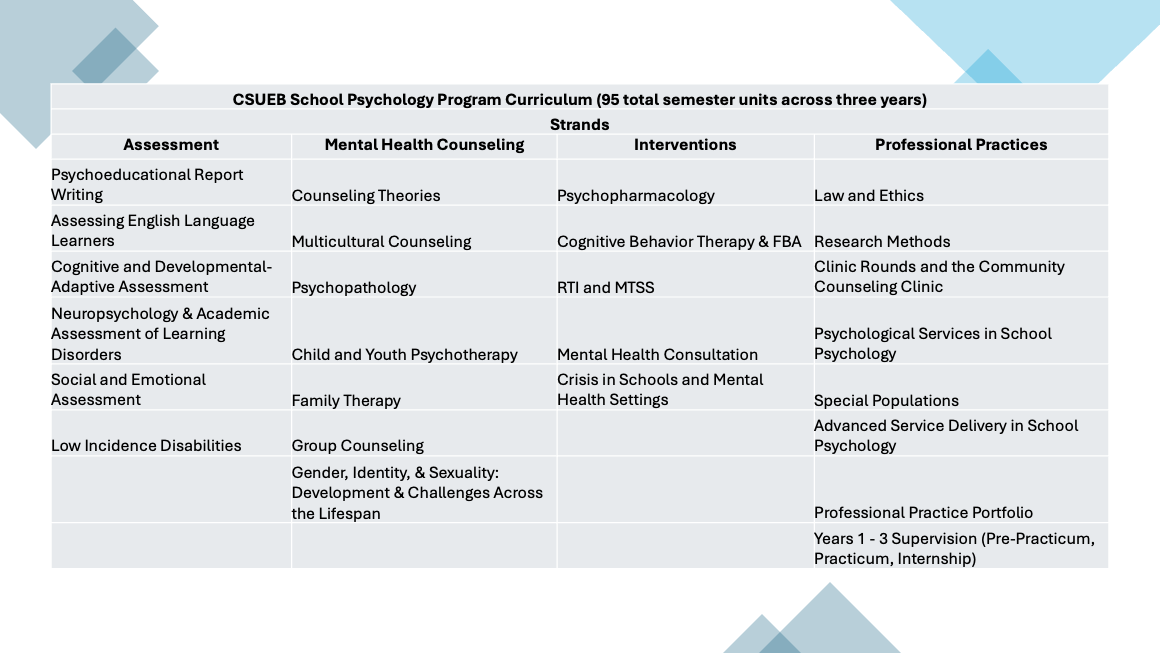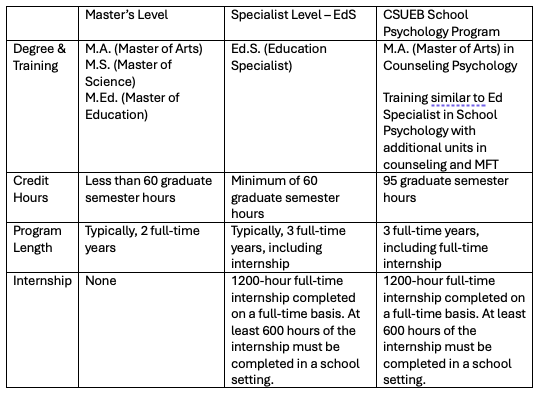1. Are there prerequisites to the program?
Prerequisites are considered foundational and preparatory courses for graduate-level work. Applicants must complete the following five courses or their equivalent with a grade of B or better prior to starting the fall semester:
- Theories of Learning Behavioral or Cognitive Psychology or Conditioning and Learning or Applied Behavior Analysis
- Statistics
- Abnormal Psychology
- Human, child, or Adolescent Development
- Psychological Tests OR Research Design
Please refer to the Prerequisite Equivalency Course List to determine if your past courses and/or courses from other institutions fulfill these requirements. This is not an exhaustive list; these are only examples.
If your institution or course is not listed, please contact the Program Coordinator for School Psychology: Dr. Oanh Tran - Email: oanh.tran@csueastbay.edu. Include a copy of the unofficial transcript, course description, course number, institution, and date completed.
2. Is the GRE required?
No, the GRE is not required. However, if you have taken the GRE and want to include the scores with your application, you can do so.
3. What if my GPA is below 3.0.
The minimum GPA requirement for the department is 3.0 to be competitive. However, we review applications holistically, and other aspects of your application can compensate for a low GPA. In your statement of purpose, please discuss any extenuating circumstances that contributed to your GPA.
4. Who should I ask for a letter of recommendation?
This is a professional environment; therefore, we are looking for references who can speak to your professional skills and abilities to succeed in graduate school and work with others. Ask professors, supervisors, and colleagues who can address these areas. At least one letter should come from someone in academia.
5. What is the difference between the school counseling and school psychology programs?
School Psychology: The specialization in school psychology authorizes the candidate to perform the following duties:
- Provide services that enhance academic performance.
- Design strategies and programs to address problems of adjustment.
- Consult with other educators and parents on issues of social development and behavioral and academic difficulties.
- Conduct psycho-educational assessment for purposes of identifying special needs.
- Provide psychological counseling for individuals, groups, and families.
- Coordinate intervention strategies for management of individuals and schoolwide crises.
School counseling: The specialization in school counseling authorizes the candidate to perform the following duties:
- Develop, plan, implement, and evaluate a comprehensive, data-driven school counseling program that includes academic, college/career, social-emotional, and mental health services.
- Advocate for the academic, college/career, social-emotional, and mental health needs of all applicants.
- Utilize school data to make informed decisions to address inequities in school.
- Provide schoolwide prevention and intervention strategies and counseling services.
- Provide consultation, training, and staff development to teachers and parents regarding applicants’ needs.
6. When are courses offered? Are classes in-person or online?
Our school psychology program is primarily in-person at the Hayward campus, with a few classes offered synchronous online. Courses follow a defined cohort sequence during the fall and spring semesters, starting 9:30am and can extend into the evening (8pm). Classes meet 2.5 to 3 days a week, with the remaining days dedicated to practicum/fieldwork and volunteering in our Community Counseling Clinic (CCC). If you are interested in an on-line program, this is not the program for you as most of our classes are in-person.
7. Can I apply to more than one MS Counseling program in the Educational Psychology Department?
No, you may only apply to one program at a time.
8. Do you offer a PPS Credential-only program for applicants who already have a Master’s degree?
No, we follow a cohort model in which candidates take the same sequenced courses together. Each course builds on the previous ones.
9. Can I work while being a student in the program?
The program is intensive in terms of time and coursework, so any outside employment is discouraged. Some students receive a small stipend from fieldwork districts during the second year, and most students receive a stipend from internship districts during the third year. Courses are offered from morning to evening, and when not in classes, candidates are in fieldwork. This is not a program for working professionals.
10. Are there graduate assistantships and/or graduate work-study positions available.
Paid positions are dependent on funding. Students are encouraged to contact the financial aid department and complete a Free Application for Federal Student Aid (FAFSA).
11. What happens if I can’t make it to one of the program informational sessions?
Information sessions provide an overview of our program, prerequisites, course of study, and application and interview process. We offer multiple sessions throughout the school year during the day and evening hours.
12. Can I apply with any Bachelor’s degree major and work/volunteer background?
Yes, we encourage candidates from all majors and work/volunteer backgrounds to apply. The degree must be from an accredited institution, and all program prerequisites must be completed prior to starting our program.
13. Where can I learn more about the profession?
Applicants can learn more about school psychology through the following resources: National Association of School Psychologists (NASP), CA Association of School Psychologists (CASP), CA Commission on Teacher Credentialing (CCTC), American Association for Marriage and Family Therapy (AAMFT), reading articles, attending conferences, webinars, and interviewing/shadowing school psychologists.
14. When and how will I be notified about an interview for the program?
Applications are reviewed on a rolling basis. Qualified applicants will be invited to interview with program faculty. Interviews are scheduled until the cohort is full. Depending on the quality of your application and applicant pool, applicants may hear back about an interview within a few weeks or months.
15. What is the program of study & evaluation process?
The MS in Counseling Psychology degree with a concentration in School Psychology, integrated with Marriage and Family Therapy, is a 95-unit program completed over 3-years (2 years of fulltime course work and 1 year of 1200 hour internship). There is no option to select parts of the program. We are an integrated program with counseling, clinical, and school psychology coursework.
Candidates must satisfactorily complete all coursework and fieldwork requirements to be recommended for the degree and credential. Candidates are evaluated on their academic and fieldwork performance, clinical aptitude, and professional development in NASP/CTC standards.
16. Is there any advisor that I could speak to about the program?
Due to limited staffing, we do not offer individual meetings with prospective students. Please attend a zoom information session for Q&A and explore our website to learn more. Our website provides all the information you need about our program and application process. For specific questions regarding your application, you can contact the program coordinator, Dr. Oanh Tran (oanh.tran@csueastbay.edu).
17. Will you accept any transfer units from another institution?
Applicants for the school psychology program may be eligible to transfer up to 9 units from another institution, provided the candidate has completed graduate training in counseling or school psychology. We do no not accept any transfer units from the Bachelor’s level. Please contact Dr. Tran to inquire about transferring units.
18. Where can I obtain volunteer or job experience?
Students typically gain related experience working as substitute teachers, behavioral technicians, counselors with children/youth or summer camps, or teachers’ assistants. For volunteer experience, contact your local school to volunteer in the classroom, community library, or city programs. It is important for the experience to be in a professional setting in which individuals/supervisor/coworkers can observe your professional skills.
19. Where are field placements?
For candidates to be placed in a district or clinical setting, there must be an agreement (Memo of Understand, MOU). We have MOUs with districts across Northern CA and the San Francisco Bay Area, where candidates are primarily placed. In the first year, candidates are assigned to pre-selected districts and supervisors. In the second and third years, candidates attend a district recruitment career fair hosted by the program, where they can meet with recruiting districts. If there is no MOU, candidates may “pioneer” with new districts. A procedural process is available to support candidates in seeking new placements in which we have not had a placement.
20. How many applicants do you accept?
Admission to the school psychology program is highly competitive, with an acceptance rate of less than 20%. The number of students admitted is also dependent on the budget. Cohort size can range from 8 to 16 students. It is essential for applicants to follow the application requirements and submit all documents by the specified deadline. Applications with missing materials will not be reviewed.
21. What can I do if I have already completed my bachelor's degree and still need to complete prerequisites.
Prerequisites can be taken at any accredited college, university or online program. It is the responsibility of the applicant to research where prerequisites can be taken. If interested in taking prerequisites at CSUEB prior to fall admissions, applicants can enroll through Open University enrollment. Through Open University enrollment, applicants can enroll in undergraduate classes on a space available basis without the formal University process. These prerequisite courses are typically offered through the Psychology or Human Development departments. Contact these departments on when classes are offered.
22. Can prospective students enroll in program graduate courses?
No, program courses are for admitted students only. Anyone outside of the program, cannot enroll in our school psychology/MFT classes until being formally admitted into the program.
23. What makes a strong applicant or application?
Strong applicants prepare in advance for the application process by doing their research on the program and application process, attending an information session, and learning about the profession. It is the prospective's responsibility to explore our website as there is an abundance of information available that can answer your questions. Please keep in mind that your questions to faculty can demonstrate your readiness in the application process and potential as a student in the program.
24. What makes an ideal candidate?
A candidate that possesses the following (ACUP): Academic excellence: good grades, strong academic performance; Ccommitment to social justice and diversity: shows dedication to social justice and diversity through advocacy work for vulnerable populations; Unique and relevant experiences: brings unique experiences that can enhance the curriculum, learning environment, and field of school psychology; Professional dispositions: exhibits strong professional dispositions, including empathy, self-awareness, integrity, flexibility, resourcefulness, leadership, collaborative-receptive mindset, and tolerance for ambiguity. ACUP are areas that are promoted and evaluated in the program.








